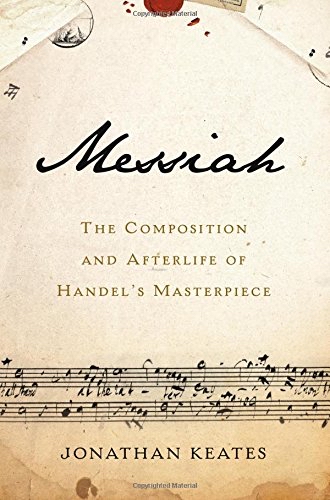
Another Reason to Rejoice Greatly
December 8, 2017 | The Wall Street Journal
It is a December evening, and you’re trapped in a school auditorium for the holiday concert. The long-suffering music director raises a baton, the violins screech horribly and some petrified high-school tenor, all puberty and nerves, squeaks out the first few notes of “Comfort Ye,” the opening aria of Handel’s “Messiah.” Your soul convulses as you realize just how long a night lies ahead. Or you’ve taken your seat at an expensive symphonic concert of the same work. Faced by an enormous and prestigious orchestra and chorus, you realize in the first bars of the opening sinfonia that the conductor has established a glacial pace, determined to give each 16th note its wooden due. This is “Messiah” as cliché and “Messiah” as chore: a great work trotted out annually, drained of life and very nearly ruined.
As far back as 1891, the Irish playwright George Bernard Shaw railed against “the custom of singing Handel as if he meant nothing.” In Shaw’s day the fashion was to mount epic “Messiah” festivals in celebration of England itself, with performances featuring as many as 3,000 singers and 460 orchestra members. The stage and the spirit groaned under such excess. Additional orchestrations were added to the score, and spectacle drowned out the music. Someone, Shaw said, should put together “a thoroughly rehearsed and exhaustively studied performance . . . with a chorus of twenty capable artists. Most of us would be glad to hear the work seriously performed before we die.”
Shaw may or may not have gotten his wish, but, as Jonathan Keates observes, greater focus and clarity in Handel interpretation did emerge in the mid-20th century. Scholarly conductors like Christopher Hogwood and John Eliot Gardiner stripped away the cultural baggage of “Messiah” like curators restoring a painting. Their brisk tempos meant engaging elite musicians who could keep up during the piece’s challenging melisma runs. (Mr. Gardiner’s “Messiah” is almost 20 minutes shorter than some interpretations on offer.) The music became fast and light and breathed once more. Listening to such a performance can be a profound experience that reveals “Messiah” not as a feat of obligation but as a work of art.
Mr. Keates quotes Shaw and deplores “big-band Handel” in his delightful “Messiah: The Composition and Afterlife of Handel’s Masterpiece.” This richly illustrated book is like a lively performance of the piece itself. At 130 pages, it is not a word too long and manages to capture the essence of Handel’s magic. Mr. Keates celebrates the “emotional range” and “incomparable universality” of “Messiah” and writes of “the directness of its engagement with our longing, our fears, our sorrows, our ecstasy and exaltation.”
Handel composed “Messiah” at a sprint in 1741 in London. He then took his manuscript to Dublin in a sojourn that was part sabbatical and part theatrical preview. The yet-untitled score needed work, and Handel wanted to test it out on Irish audiences before facing the discerning patrons of Covent Garden. In one of many such passages, Mr. Keates finds a telling anecdote about Handel’s year abroad. At a Dublin performance, concertmaster Matthew Dubourg lost his way during a violin cadenza. A contemporary account said that “he wandered about in different keys a great while, and seemed indeed a little bewildered and uncertain of his original.” When he finally found his way back, the composer himself called out to general delight, “You are welcome home, Mr. Durbourg.”
“Messiah” is an oratorio: a large-scale work for orchestra and chorus that dramatizes a religious story. Handel himself had introduced London audiences to the form with works in the 1730s like “Saul” and “Israel in Egypt.” A newspaper advertisement for one of his concerts in 1732 tried to head-off audience disappointment: “NB There will be no Action on the Stage, but the House will be fitted up in a decent Manner for the Audience.” Mr. Keates explains that Handel’s great contribution to the oratorio was to expand the role of the chorus, making it an active participant in the drama.
As a commercial composer in the 1740s and 1750s, Handel had to do his share of hustling on behalf of “Messiah.” He was largely responsible for coordinating ticket sales and selling copies of the score. Mr. Keates describes Handel as somewhat “calculating and opportunistic” and notes the way he reworked arias based on available performers. His treatment of the sacred text as a route to profit caused tension with his pious librettist Charles Jennings, who groused about the finished product: “ ’Tis after all, in the main, a fine Composition, notwithstanding some weak parts, which he was too idle & too obstinate to retouch.” Mr. Keates writes that Handel’s own favorite movement was “He trusted in God,” an intense minor-key fugue.
The greatest of all choral composers, J.S. Bach, looms over this story. In the book’s only weakness, Mr. Keates approaches Bach defensively on Handel’s behalf in an attempt to head off criticism of his man as the lesser artist. The two were contemporaries of the baroque, but while the rich and famous Handel wrote for the paying public, Bach composed for the church and would find his greatest renown posthumously. Mr. Keates resists comparisons of “Messiah” with Bach’s two Passions (St. John and St. Matthew) or his Mass in B-minor. That is just as well, for Bach’s choral masterworks were more musically audacious, structurally complex and artistically satisfying. But reasonable minds can differ, and in Mr. Keates Handel has an able champion. He has dusted off “Messiah” and reminded us of all it can be.